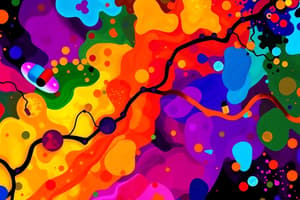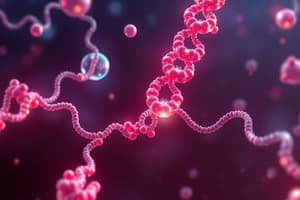Podcast
Questions and Answers
What is one major advantage of DNA recombinant technology when compared to the extraction of proteins from biological fluids?
What is one major advantage of DNA recombinant technology when compared to the extraction of proteins from biological fluids?
It overcomes the problem of source availability and enhances product safety.
How does recombinant DNA technology contribute to producing higher quantities of proteins?
How does recombinant DNA technology contribute to producing higher quantities of proteins?
It allows for a more efficient production process than extraction from biological fluids.
In the context of biologic drug production, what is a benefit of engineering therapeutic proteins?
In the context of biologic drug production, what is a benefit of engineering therapeutic proteins?
Engineered proteins can exhibit improved pharmacokinetics and longer half-lives.
What role does site-directed mutagenesis play in the development of therapeutic proteins?
What role does site-directed mutagenesis play in the development of therapeutic proteins?
Why might one prefer biologic drugs over traditional small molecules?
Why might one prefer biologic drugs over traditional small molecules?
What initial processes are involved in the production of small molecules?
What initial processes are involved in the production of small molecules?
What are pre-clinical studies crucial for in the development of a new drug?
What are pre-clinical studies crucial for in the development of a new drug?
How do biologics potentially reduce the risks associated with disease transmission?
How do biologics potentially reduce the risks associated with disease transmission?
What is a disadvantage of extracting proteins from inappropriate biological sources?
What is a disadvantage of extracting proteins from inappropriate biological sources?
How can the traditional pharmaceutical industry be contrasted with biotech approaches?
How can the traditional pharmaceutical industry be contrasted with biotech approaches?
Flashcards are hidden until you start studying
Study Notes
Protein-Based Drug Targets and Genomics
- Between 3000 and 10,000 new protein-based drug targets can be identified within the human genome sequence.
- Hundreds of pathogen proteins present in human pathogens provide additional targets for drug development.
- Genomics facilitates the discovery of previously unrecognized proteins with potential therapeutic applications.
Pharmacokinetics of Biotech Drugs
- Pharmacokinetics (PK) refers to how the body modifies drugs post-administration, differing significantly for peptides/proteins compared to traditional chemical drugs.
- Chemical drugs are treated as exogenous molecules, leading to their elimination once recognized by the body.
- Biotech drugs are not perceived as foreign, hence they are not expelled like conventional drugs; instead, they are digested and absorbed.
- Administration of biotech drugs typically occurs via parenteral routes: intravenous, subcutaneous, and intramuscular due to their high molecular mass and instability in non-parenteral forms.
Drug Discovery and Specificity
- Only 1 in 1000 chemical drugs successfully reaches the final phase of drug discovery, whereas biological drugs progress more easily with known protein structures indicating function.
- Biologics often exhibit improved specificity, reducing the risk of off-target side effects commonly linked to small molecules.
Production of Biotech Drugs
- Key initial step in biotech drug production is gene cloning, such as producing insulin from A and B chains.
- Essential knowledge for biotech drug development includes genomics, focusing on gene function and mutation analysis in various conditions.
- Proteomics also plays a critical role in understanding protein function and structure, providing insights essential for drug development.
Targeting Strategies
- Biotech drugs can target either genes/products of transcription (gene therapy/antisense nucleotides) or gene products of translation (proteins/antibodies).
- Production of therapeutic proteins necessitates comprehensive understanding of the target protein's function, structure, and the encoding gene's sequence.
Advantages of Recombinant DNA Technology
- Recombinant DNA technology surpasses traditional protein extraction from biological sources by addressing several challenges:
- Availability: Generates proteins that may be scarce in natural sources.
- Safety: Reduces risks of disease transmission from human and animal sources (e.g., HIV, hepatitis, Creutzfeldt-Jakob).
- Quantity: Allows for higher yields of proteins, making the process more cost-effective.
- Engineering: Facilitates modifications for improved clinical outcomes, such as altered pharmacokinetics and extended half-life through mutagenesis or addition of molecules (e.g., PEG).
Small Molecule Production Process
- Small molecule production begins with classical screening from various sourcing (microbes, plants, libraries).
- Active compounds are identified through in vitro assays followed by in vivo tests to confirm efficacy.
- Pre-clinical studies must be conducted, including pharmacological evaluation, pharmacokinetics (PK), pharmacodynamics (PD), and toxicological assessments.
Studying That Suits You
Use AI to generate personalized quizzes and flashcards to suit your learning preferences.




